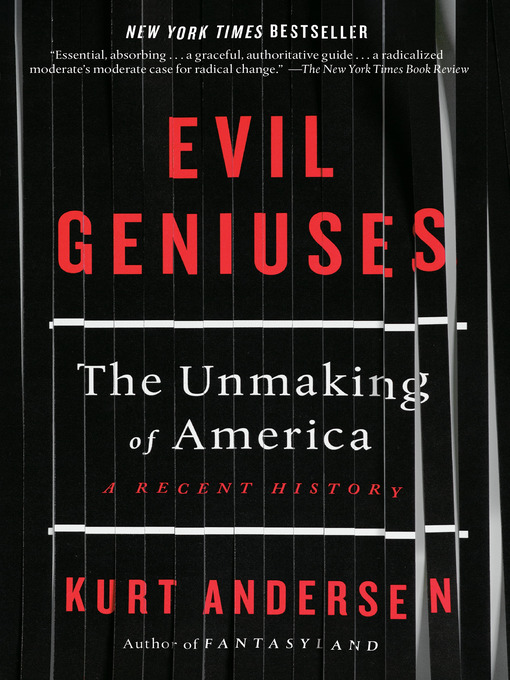
Evil Geniuses
The Unmaking of America: A Recent History
کتاب های مرتبط
- اطلاعات
- نقد و بررسی
- دیدگاه کاربران
نقد و بررسی

August 3, 2020
In this sweeping jeremiad, journalist Andersen (coauthor, You Can’t Spell America Without Me) traces the origins of today’s economic inequality and political dysfunction to “the quite deliberate reengineering of our economy and society since the 1960s by a highly rational confederacy of the rich, the right, and big business.” This reengineering, Andersen contends, was aided and abetted by a more spontaneous cultural trend: “a wholesale national plunge into nostalgia” in TV (Happy Days), movies (Grease), music (Bruce Springsteen), and design (New Urbanism). Right-wing politicians and economists exploited this “nostalgia boom,” Andersen writes, by pitching regulatory rollbacks, tax cuts, and small government as a return to a more “rugged” and “frontiersy” America. Andersen also blames the Clinton administration’s deregulation of financial markets and the Supreme Court’s gutting of campaign finance laws for contributing to today’s “extreme insecurity and inequality,” and holds out tentative hope that the coronavirus pandemic and protests against racial injustice will shock the country out of its economic, political, and cultural stasis. Much of Andersen’s material will be familiar to newshounds, but he arranges it into a cohesive argument backed by hard data and stinging prose. Readers will get a clearer picture of how the U.S. got to where it is today.

August 1, 2020
How inequality happened in America. Journalist, editor, magazine founder (Spy, Inside), and host of the public radio broadcast "Studio 360," Andersen builds on the political and cultural critique he offered in his last book with a timely, hard-hitting analysis of America's "hijacked, screwed-up political economy." "Whereas Fantasyland concerned Americans' centuries-old weakness for the untrue and irrational, and its spontaneous and dangerous flowering since the 1960s," he writes, "Evil Geniuses chronicles the quite deliberate reengineering of our economy and society since the 1960s by a highly rational confederacy of the rich, the right, and big business." Synthesizing many works on capitalism, inequality, greed, and corruption, Andersen focuses on the "hyperselfishness" that took hold in the 1970s, when economic equality was "at its peak." What Tom Wolfe called the "Me Decade" extended beyond personal behavior to infect the nation's economy, leading to "strategizing, funding, propagandizing, mobilizing, lobbying, and institution-building" by big business, turning the U.S. political economy "into a winner-take-all casino economy." The author sees the '70s as a turning point in American life that gave rise to neoliberalism, a move toward deregulation of business, and a glorification of a culture of greed. "The anti-Establishment subjectivity and freedom to ignore experts and believe in make-believe that exploded in the '60s was normalized and spread during the '70s and beyond," he writes (especially during Reagan's presidency) and is in evidence today in a mistrust of government--regulations, taxes, oversight--and a nostalgia for some imagined, stable past. Andersen believes that change can occur, unrelated to partisan politics: He urges Americans to push for "goals that can seem radical--lots more power for workers and average citizens, optimizing the economy for all Americans rather than maximizing it for rich ones and corporations--but then being nondoctrinaire about how we achieve the goals." A rousing call for desperately needed systemic transformation.
COPYRIGHT(2020) Kirkus Reviews, ALL RIGHTS RESERVED.

August 28, 2020
Since the 1980s, many national business policies and judicial rulings have been dictated by evil geniuses who have restructured the economy to benefit the wealthy at the expense of the disappearing middle class and the growing number of poor, writes Andersen (Fantasyland). The past four decades have seen large-scale job loss, numerous mergers, easy loans, high interest rates, and the demise of unions further exacerbated by globalization and technology. President Ronald Reagan reigned over this pro-business era, yet he was supported by neoliberals who believed the economic pendulum had swung too far left. Since the 1990s, Andersen claims, a new class of poorly paid service workers, whose purpose is to tend to the wealthy, has replaced much of the middle class. Andersen's deeply researched investigation concludes hopefully that the current plutocratic era has run its course, and that citizens are capable of doing the hard work of challenging economic inequality. VERDICT The captivating narrative is at times slowed by a plethora of statistics and data, yet overall, is an illuminating investigation of post-1960s U.S. economic history that will engage readers of contemporary politics. See Rick Perlstein's Reaganland for a detailed narrative of Reagan's role in the nation's shift to the right and his advocacy of pro-business governance.--Karl Helicher, formerly with Upper Merion Twp. Lib., King of Prussia, PA
Copyright 2020 Library Journal, LLC Used with permission.

























دیدگاه کاربران